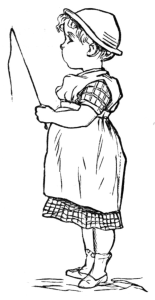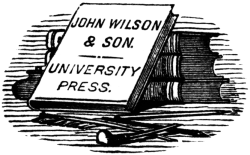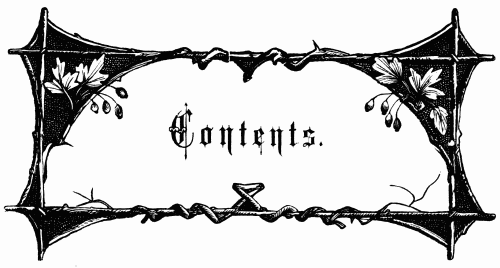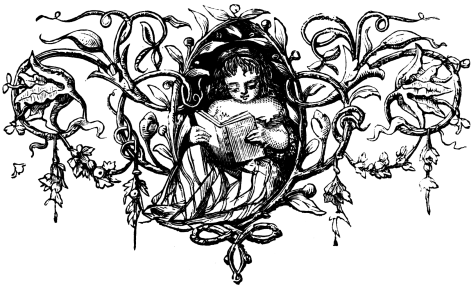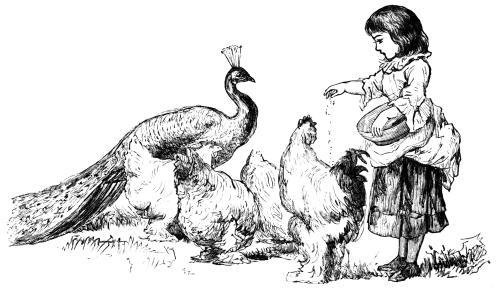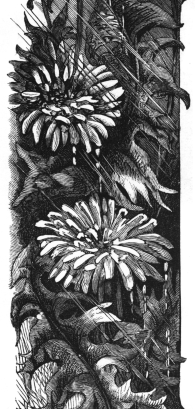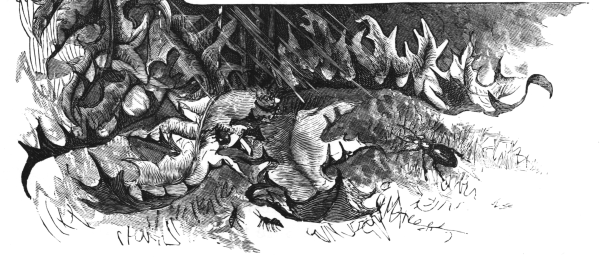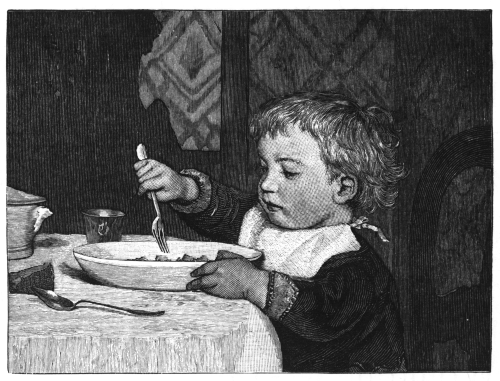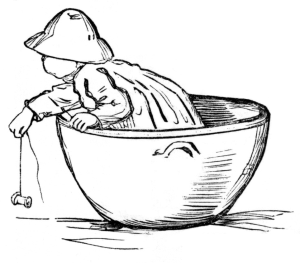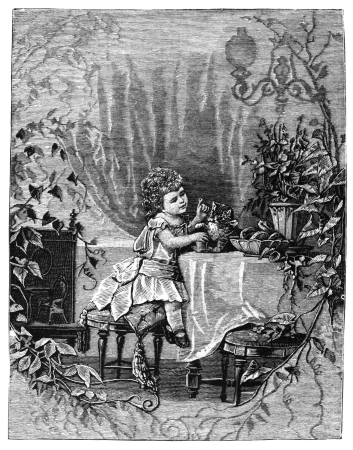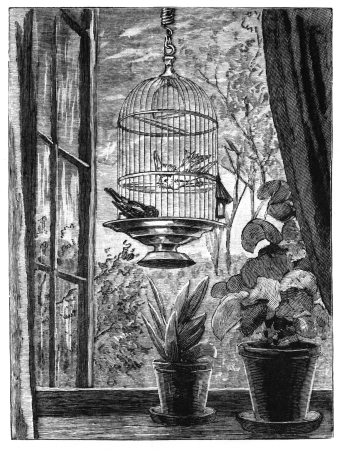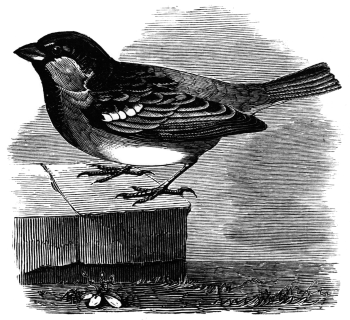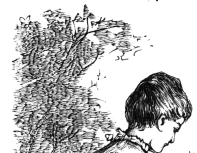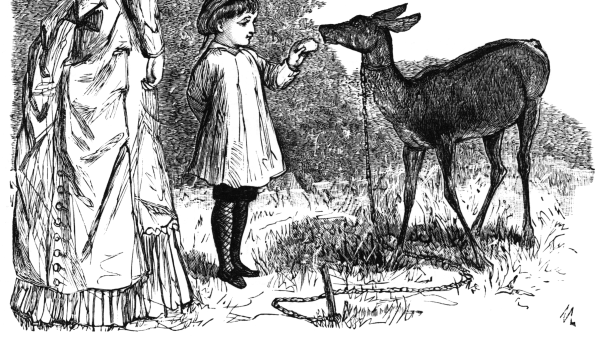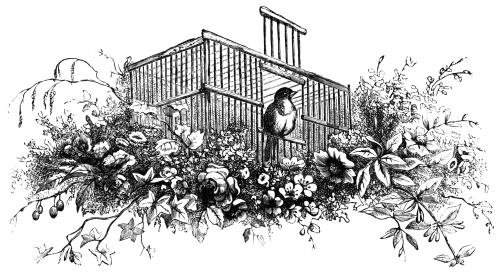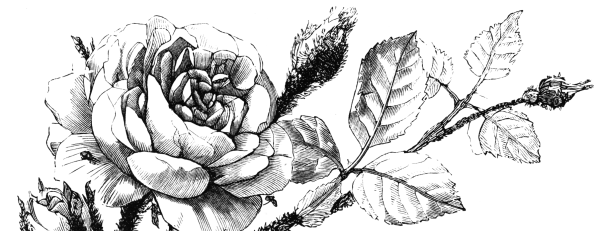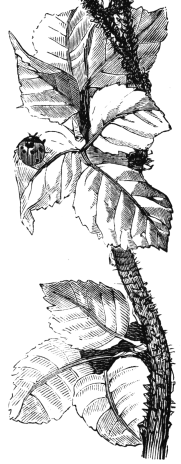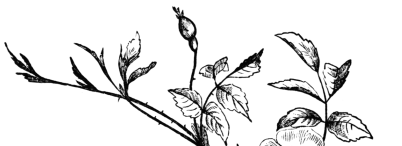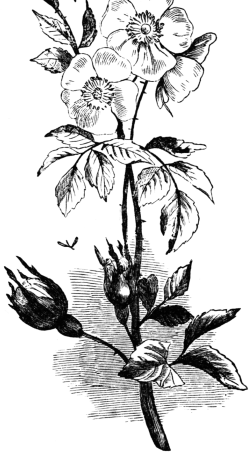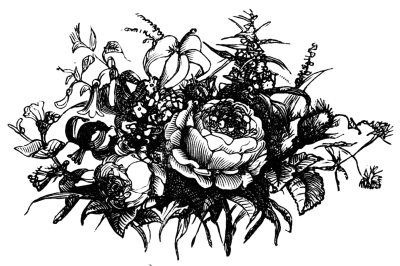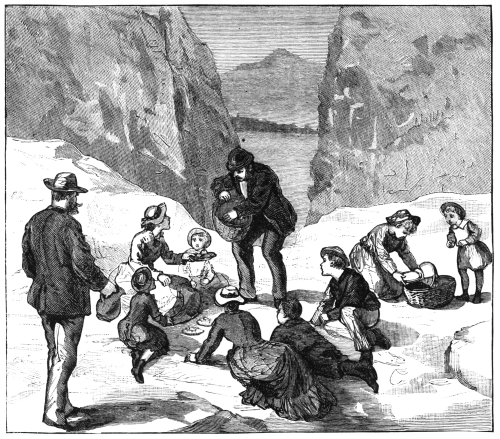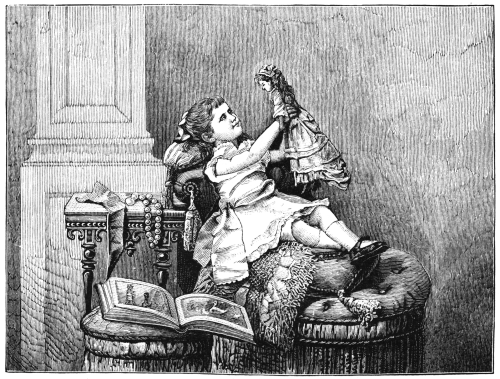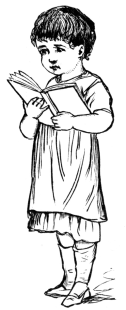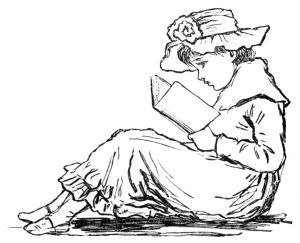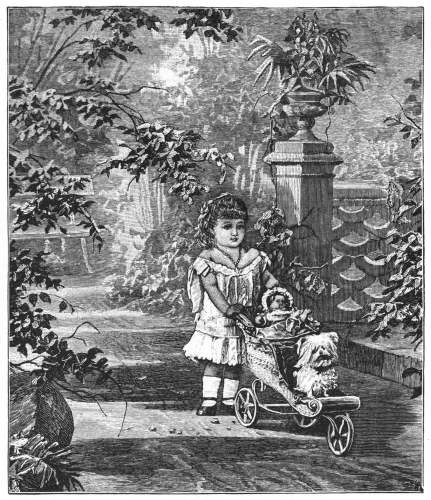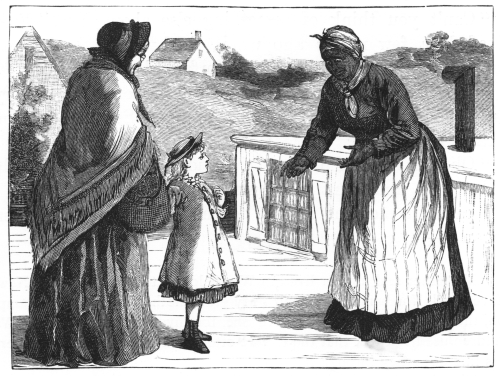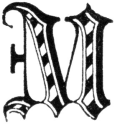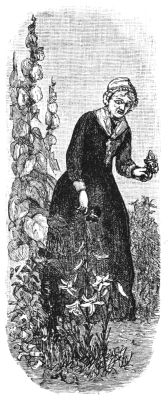The Project Gutenberg EBook of The Nursery, June 1881, Vol. XXIX, by Various
This eBook is for the use of anyone anywhere at no cost and with
almost no restrictions whatsoever. You may copy it, give it away or
re-use it under the terms of the Project Gutenberg License included
with this eBook or online at www.gutenberg.org
Title: The Nursery, June 1881, Vol. XXIX
A Monthly Magazine for Youngest Readers
Author: Various
Release Date: September 14, 2012 [EBook #40757]
Language: English
Character set encoding: ISO-8859-1
*** START OF THIS PROJECT GUTENBERG EBOOK THE NURSERY, JUNE 1881, VOL. XXIX ***
Produced by Emmy, Juliet Sutherland and the Online
Distributed Proofreading Team at http://www.pgdp.net Music
transcribed by June Troyer.
THE
NURSERY
A Monthly Magazine
For Youngest Readers.
VOLUME XXIX.—No. 6.
BOSTON:
THE NURSERY PUBLISHING COMPANY,
No. 36 Bromfield Street.
1881.
Entered according to act of Congress, in the year 1881, by
THE NURSERY PUBLISHING COMPANY,
In the Office of the Librarian of Congress at Washington.
IN PROSE.
| | PAGE |
| The Careless Nurse | 161 |
| Master Baby | 165 |
| Two Small Boys | 166 |
| A Saucy Visitor | 168 |
| How Georgie Fed his Fawn | 171 |
| Drawing-Lesson | 177 |
| A Picnic in a Strange Garden | 178 |
| Two Small Girls | 182 |
| The Careful Nurse | 183 |
| Ralph's Great-Grandmother and her History | 185 |
IN VERSE.
| | PAGE |
| Feeding the Fowls | 163 |
| A Polite Dandelion | 164 |
| Kitty didn't mean to | 167 |
| The Rose | 173 |
| Margie's Trial | 180 |
| Why the Chick came out | 184 |
| June | 188 |
[161]
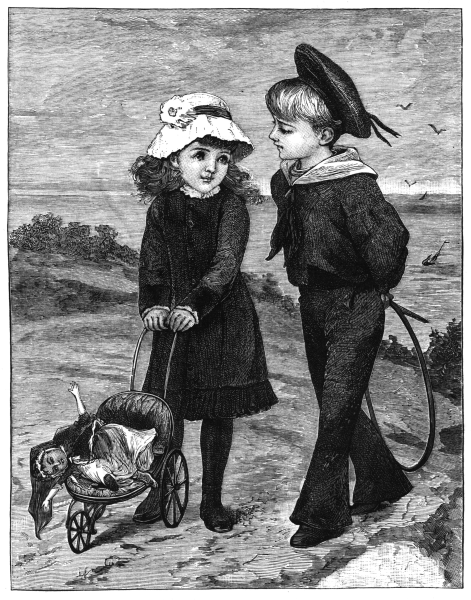 VOL. XXIX.—NO. 6.
VOL. XXIX.—NO. 6.
THE CARELESS NURSE.
HE rights of man do not give me much concern;
neither do I trouble myself much about the rights
of woman. My mission is to look after the rights of
children. I never forget this wherever I may be.
[162]
Some people may think that the rights of children are
safe enough in the care of the fathers and mothers.
Are they indeed! How many children are sent out, day
after day, in charge of nurses? Who protects the children
against careless and cruel nurses? Anxious mother, answer
me that.
Many cases of gross neglect have come under my eye. I
will mention one case that took place last summer at the
seaside.
I was out in my yacht at the time. Scanning the shore
with my spy-glass, this is what I saw:—
A good-looking young woman was pushing a baby-carriage
before her. In the carriage was a little child. The young
woman seemed to be singing, and all went well until a
young man came up and walked by her side.
From his dress I should say that he was a sailor. Perhaps
he had just landed from a man-of-war. His trousers had
the man-of-war cut.
The young man and the young woman talked and laughed
together as they went along. They seemed to be very good
friends. But what became of the infant in the carriage?
Poor child! She fell off the seat. Her head hung over
the side of the carriage, just in front of the wheel, and there
she lay shrieking for help.
I could not hear her shrieks, for I was a mile away; but
the sight was enough for me. I seized my trumpet. "Shipmate,
ahoy!" I shouted to the sailor-chap.
No answer. It was plain that the sailor-chap did not
care in the slightest degree for that poor suffering child.
Nobody offered to help her.
"Steer for the shore!" I said to my helmsman. "Bear
down to the rescue!" We landed as soon as we could, but
not without some delay, and when we reached the place[163]
it was too late. Nurse, carriage, sailor-chap, and all were
gone.
What was the fate of that poor infant is a mystery to me
to this day. But I tell the story as a warning to all mothers
against trusting their children to a careless nurse.
JACK TAR.
FEEDING THE FOWLS.
Pecking away, and looking so knowing,
Feathers and tails in the breezes blowing,
"Cluck, cluck, cluck!" come the hens to be fed,
And Edith is scattering crumbs of bread.
The peacock comes also, strutting so grandly,
His long tail behind him trailing so blandly,
Doesn't he look as proud as a king,
With his crown, and his tail, and his brilliant wing!
S. T. U.
[164]
A POLITE DANDELION.
By George Cooper.
"Oh, what shall I do, Dandelion?
My white satin gown will be spoiled:
The rain has begun;
I've nowhere to run;
And my bonnet and all will be soiled."
"Don't be in a flutter, Miss Miller,
And where are you going so fast?
My sunshade of gold
Above you I'll hold
Till this very hard shower has passed."
[165]
MASTER BABY.
ASTER BABY has been playing in the park all
the morning. He has been chasing a butterfly.
He did not catch the butterfly. But he has come
home with two rosy cheeks and a good appetite.
Now he must have his dinner. Tie his bib
around his neck. Seat him at the table. Give him some
soup. Now cut him up some meat and potato, and let him
feed himself.
He is a little awkward; but a hungry boy will soon learn
how to handle a fork. Let him alone for that. It will not
take long to teach him how to use a knife too.
Boys need a good deal of food to make them strong and
hearty. Give them plenty of fresh air. Let the sun shine
on them. Then they will be sure to eat with a relish.
J. K. L.
[166]
TWO SMALL BOYS.
This is our Sam. He is the
boy who goes to sea in a bowl.
He throws out a
line, and catches a
fish. What does
the fish look like?
Where would Sam
be if the bowl should tip over?
Would he get wet?
This is Billy with his whip.
He thinks he would
like to drive a coach.
But where will he get
his team? He will find
it, I dare say, without
going out of the room.
An arm-chair will do for a
coach, and a pair of boots will
make a fine span of horses.
M. N. O.
[167]
KITTY DIDN'T MEAN TO.
Joanna scolds my kitty every day:
I'm filled with grief.
Just now to Mary Ann I heard her say,
"That cat's a thief!"
Poor kit! you did not wish for milk to-day,
But wanted meat.
You took a little bit from off the tray,
[168]And, with your feet,
A glass of water, standing in the way,
You tumbled down;
And just for this you had to bear, all day,
Joanna's frown.
I think that Miss Joanna must be seen to;
For, kitty, I am sure you didn't mean to.
AMANDA SHAW ELSEFFER.
A SAUCY VISITOR.
NCE upon a time a mother-sparrow and her three
children lived in a great big maple-tree, which stood
before a great big house, which had a broad piazza
in front of it. The mother-bird often used to talk
to her children about the people who lived in the
house, and their pets.
"See, Polly Dolly Adeline," she said to her oldest child
one day, "see those lazy yellow canaries down there on the
piazza. They have every thing they want. See how they
are coddled while we are left to shift for ourselves."
"Boo-hoo!" said Polly Dolly. "I don't think it is a bit
fair."
"I don't either," said the youngest of all. He was a
pert little fellow. His name was Flop. He was so called,
because, when he first began to fly, he would flop over on
one side.
But he could fly well enough now, and so he said boldly,
"I mean to go down to one of those cages, and eat some of
that nice seed myself. I'll let young Canary know that I
am as good as he."
[169]
At these words Mrs. Sparrow was so frightened that she
fell off the branch; but she soon flew back, and said, "Flop,
you naughty boy, don't you go! you may get killed."
"Cats, you know, Flop!" said Polly Dolly Adeline. "Cats
with green eyes!"
"Pooh!" said Flop. "Who cares? I'm not afraid."
Flop flew gaily down to the piazza railing. Here he
stopped, and looked around; while his mother and sisters
watched him in fear and trembling. Nobody was on the
piazza: so Flop flew straight to one of the cages.
"How do you do, my young friend?" he said, saucily[170]
helping himself to the seed that had been scattered. "I've
come to take dinner with you."
Mr. Canary did not like this at all. "You've not been
invited," he squeaked out, ruffling up his feathers, and flying
at Flop with all his might. But the bars were between
them; and Flop went on eating his dinner as calmly as
possible.
Then the canary became so angry that he danced back
and forth on his perch, and screamed. Flop made another
very polite bow. "Oh, how good that hemp-seed tastes!"
said he. "The rape-seed, too, is very nice,—nice as the
fattest canker-worm I ever ate."
So he went on eating, looking up now and then to wink
at his angry host. When he had eaten all he could find, he
made his best bow and said saucily, "Thank you, sir, thank
you. Don't urge me to stay longer now. I'll come again
some other day," and he flew back to his anxious mother
and sisters.
B. W.
[171]
HOW GEORGIE FED HIS FAWN.
EORGIE stood at the kitchen-door with a piece of
bread in his hand to feed his pet fawn. There
was the fawn chained to a post in the grass-plat.
Between them was a long gravel walk. How was
Georgie to get the bread to the fawn?
Easily enough, one would think,—by carrying it straight
to the fawn. But Georgie didn't find this such an easy
thing to do. He met with difficulties.
In the first place there was Rover, the big brown pup.
Georgie had not taken three steps, when Rover spied the
bread, and, thinking it was for him, began jumping after
it. Georgie thought he would have to run back to the
house; but, seeing a stick on the ground, he picked it up,
and shook it at Rover. Rover was afraid of the stick, and
ran meekly away.
Nothing else happened to trouble Georgie until he had
gone halfway up the walk. Then he met another difficulty.
Two big turkey-gobblers, looking very red about the head,
and with feathers all ruffled up, rushed towards him for the
bread, crying, "Gobble, gobble!" in a frightful manner.
Georgie hesitated. Dare he go past them? "Gobble,
gobble!" screeched the turkeys. Down went the bread on
the ground, and back to the house, as fast as his legs could
carry him, ran Georgie.
His mother saw two big tears in the little fellow's eyes
and felt sorry for him. She cut another piece of bread,
turned his apron up over it so the turkeys could not see it,
and told him to run bravely past them. He hoped they
were still eating the other piece, and would not notice him;[172]
but they had swallowed every crumb and ran toward him
for more.
He screwed up his courage, and tried to run by them.
Alas! he stumbled and fell. Away rolled the bread, and,
before he could get it again, the gobblers had it and were
quarrelling noisily, each trying to pull it away from the
other one.
This second loss was more than little
Georgie could bear. He went crying
into the house. Then his sister Jennie
said she would go with him, and
keep off the turkeys. She took
some bread in one hand, and
held Georgie's hand with
the other, and this time
the turkeys were
passed
safely.
Georgie fed the pretty fawn, who took the bread from his
hand, and capered about with delight, for he likes to have
Georgie pet him, and pines for his company. Georgie is
going to ask the gardener to buy two chains and fasten
the two old gobblers in some other part of the yard. Then
he can visit the fawn often.
AUNT SADIE.
[173]
THE ROSE.
ANNIE.
The sweetest and the brightest days
Of all the happy year!
The green leaves dance, the gay birds sing,
The merry June is here!
We will of roses weave her crown,
The fairest that unclose;
Each one of different form and hue,
Yet each a perfect rose.
BESSIE.
(With a red rose.)
And this one will outshine them all;
Amid the garden's rare
And splendid flowers, it raised its head,
[174]The brightest blossom there.
All decked with dew like gems, its robe
Of royal crimson glows—
The matchless queen of summer-time,
The beautiful red rose!
CHARLOTTE.
(With a white rose.)
But this to me is lovelier far,
So pure and sweet it seems;
Among the green leaves on the bough
Like fallen snow it gleams.
Its breath gives perfume to the wind,
As over it it blows;
'Tis stainless as an angel's wings,
The fragrant, fair white rose.
[175]
DELIA.
(With a yellow rose.)
And this, to greet the early morn,
In yellow mantle shone,
Bright as is China's emperor
Upon his dazzling throne.
It opens wide its golden leaves,
Its gleaming heart it shows,—
A sunshine-loving, cheery thing,
The winsome yellow rose!
EVA.
(With a brier rose.)
Among the brambles and the brake
Beside the dusty way;
This dainty little blossom sheds
Its sweetness all the day.
It makes the rough hill pastures fair;
Amid the rocks it grows;
It clambers o'er the gray stone wall,—
The simple brier rose!
[176]
FRANCES.
(With a blush rose.)
This blushes like a morning cloud.
GERTRUDE.
(With a moss rose.)
And this is veiled in moss.
HELENA.
(With a cluster of climbing roses.)
This, with the honeysuckle-vines,
My lattice twines across.
ANNIE.
(To whom all the roses are given.)
And which one is the fairest flower
I'm sure cannot be told:
We'll twine them all in one long wreath,
The white and red and gold.
MARIAN DOUGLAS.
[177]
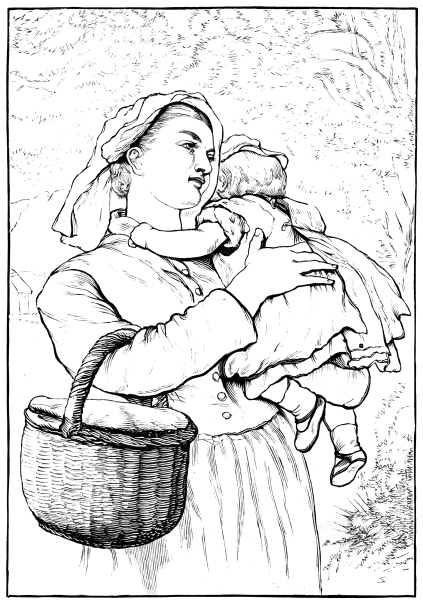 DRAWING-LESSON.
DRAWING-LESSON.
VOL. XXIX.—NO. 6.
[178]
A PICNIC IN A STRANGE GARDEN.
F I should ask you children to tell me what a garden
is, I think you would all say, "A place where trees,
flowers, and grass grow." That would be a good
answer.
But the garden where this picnic took place is of a very
different kind. Instead of bright leaves and flowers, there
are hundreds of rocks of many sizes and shapes. Its name
is the "Garden of the Gods," and it lies at the foot of the
Rocky Mountains, in Colorado.
The color of most of the rocks is red; but some are silvery
gray, and some nearly white. Seen together they make a
fine contrast. Many have strange shapes, and look like nuns
and priests, animals, birds, and fishes turned into stone.
On one high rock may be seen the image of a man and a
bear; on another, the outline of a lion's head, and part of its
body, so perfect in shape, that it seems as though some one
must have drawn it.
Some of the rocks are very high. One reaches up three
hundred and thirty feet. Near the top of it is a hole, which
looks from the ground to be about the size of a dinner-plate,
but is really large enough for a horse and buggy to pass
through.
A few trees manage to live high up on the rocks, and the
prickly cactus grows in the soil around them.
To this garden went, one bright summer day, a wagon-load
of people—six happy little girls and boys, with their
mothers and fathers—on a picnic.
The children were dressed in big shade hats, and clothes
that they might tear and tumble all they wished. Such fun
as they had! The older ones climbed the smaller rocks, and
made speeches to the little ones on the ground below. Then[179]
they all played "hide-and-seek," and never were there such
grand hiding-places.
At noon they had lunch. Their table was a large flat
rock. Mountain air and play give good appetites. How
they did enjoy eating the nice things, chatting and laughing
all the while!
After lunch away they ran in search of "specimens," by
which they meant pretty stones. They chipped pieces off
the rocks with hammers, playing they were miners finding
gold and silver. They filled their baskets, and pretended to
have made great fortunes.
They kept up the sport until five o'clock, when their
mammas said it was time to start for home, and counted[180]
the children to see if all were there. Only five could be
found. There should have been six. Who was missing?
It was four-year-old Willie. "Willie, Willie!" shouted
every one, and from the great red rock came a faint reply.
Then began "hide-and-seek" in earnest, and soon they spied
the little fellow sitting on the side of the rock full five
yards up.
"Why, Willie!" called his mamma. "What are you
doing up there?"
"Going to climb through the little hole, mamma; but I'm
tired."
His uncle climbed after him, and soon brought him down.
Six tired little children went early to bed that night, and
dreamed of stony men and women, lions and bears.
AUNT SADIE.
MARGIE'S TRIAL.
My beautiful Evelina,
Come listen to me, my dear;
I want to tell you a secret
That nobody else must hear:
We're going away to the country,—
Mamma and baby and I,
And grandmamma doesn't like dollies,
Now please, my darling, don't cry.
Oh, don't you remember last winter
She called you an image, my pet!
Just think, like those ugly old idols:
[181]I'm sure I shall never forget.
She's the loveliest grandma, my precious;
But some things are not to be borne:
I'm sure that my heart would be broken
If she should treat you with scorn.
I'll put on your very best bonnet,
Your pretty pink shoes on your feet;
And you shall sit up by the window,
And look at the folks in the street.
Oh, dear! but I never can leave you
A whole summer long on the shelf;
If you are an "image," my baby,
I'll just be a heathen myself.
EMILY HUNTINGTON MILLER.
[182]
TWO SMALL GIRLS.
Ann is not yet five years old.
But she knows how to read,
and is very fond of her
book. She does not
care to sit down, but
reads her book as she
walks. This is not a
good plan. It hurts the
eyes.
Grace, who is nine years old,
often has a book in her
hand. But she does not
read and walk at
the same time. She
sits down on the
floor. It would be quite as well
for her to take a chair and sit
up straight.
P. Q. R.
[183]
THE CAREFUL NURSE.
HIS is little Grace taking Dolly out for an airing. It
is a bright June day. The birds are singing. The
flowers are in bloom. It is so warm that Grace goes
without a hat.
Dolly is snugly seated in her carriage; and Snip
the dog, who barks, but never bites, has a place in it too.[184]
He is one of the breed known as the toy dog. He does not
bark unless you squeeze him. He is never cross.
Grace rolls them down the broad path through the garden.
She gives Dolly a nice ride, and then takes her home, and
puts her to sleep in her little bed. She never lets Dolly miss
her nap. Grace is a careful nurse.
JANE OLIVER.
WHY THE CHICK CAME OUT.
Benny Bright-Eyes, climbing over
Heaps of crisp and fragrant clover,
Spies the dearest, cutest thing,
Hiding under Biddy's wing.
What sees Benny next? A wonder!
Rudely pushed quite out from under
Biddy's breast, an egg comes sliding,
In its shell a chicken hiding.
"Ah!" says Benny as he gazes,
And his merry blue eyes raises,
"I know why his house he's spoiled:
He's afraid of being boiled."
M. J. TAYLOR.
[185]
RALPH'S GREAT-GRANDMOTHER.
ISS EASTMAN, the pretty drawing-teacher at the
academy, boards in our family. Some time ago
she chanced to take up an old, faded daguerrotype-likeness
of my grandmother. She proposed copying it; and
a lovely picture in crayon, of Ralph's great-grandmother, is
the result.
My grandmother was ninety years old when the likeness
was taken; yet she appears in it erect and vigorous, sitting
in her high-backed chair, with her knitting-work in her
hand. She wears a snug cap, and a plain Quaker kerchief
folded smoothly over her black silk dress.
Naturally we have talked much about her; and my boys,
Ralph and Fred, who have a happy faculty for drawing me
out, have well-nigh exhausted all my memories of their
great-grandmother.[186]
"Can't you think of something else about her?" Fred
pleaded, a few nights ago when, tired of his books and
games, he had seated himself comfortably before the fire.
"Yes," I replied, "I have been thinking of another story
as I sit here knitting. It is about going to Southampton on
a canal-boat."
"Oh, that's splendid, I know!" said both boys in a breath.
"Hurry up, and count your stitches quick, mamma."
I paused a moment to knit to the seam-needle, and then
began:—
"My father and mother lived in Westfield, on the banks of the New-Haven
and Northampton Canal. My grandmother lived in Southampton,
the town next north of ours. She, too, lived near the canal. We
children used to think that the trip we often took from our house to hers
was like a journey through fairy-land.
"The first time I ever went out from under my mother's wing was
with my grandmother, who took me from home with her one bright June
day. I was a little sober on parting with my mother; but the negro
cook, on board the boat a fat, jolly-looking woman, took me under her
special care.
"I went down in her cabin, and she gave me cookies and great puffy
doughnuts, and a pink stick of candy, and I watched her while she
cleaned the lamps."
"Is that all?" said Ralph, as I paused a moment to
secure a dropped stitch in the red stocking.
"Oh, no indeed!" I say as I go on,—
"By and by my grandmother's family were all scattered. My grandfather
died, and left her sad and lonely; but she still lived in the old
homestead.
"I can see her room now. There were four windows in it,—two
looking east, towards Mounts Tom and Holyoke, and two south, over a
lovely old-fashioned garden filled with tulips, hollyhocks, southernwood,
thyme, cinnamon-roses, spice-pinks, lavender, white-lilies, and violets.
"There was an open Franklin stove in the room; and a little, chubby[187]
black teapot always stood on its top. One sunny south window was
filled with flowers. Grandmother always carried a bunch of flowers to
church with her, and she had a black velvet bag, in which she carried
sugar-plums, to give to us drowsy children on Sunday afternoon, when
the minister preached one of his long sermons."
"Just one story more," said Ralph, as I again paused to
observe what progress I was making in my knitting.
"Will you promise not to ask for another one to-night?"
"We promise certain sure," said Fred.
"Only tell a long one for the last."
"Very well," said I.
"Once my grandmother made a party for a
circle of cousins. We counted nine cousins in
all when we took our seats at the supper-table."
"What did you have for supper?"
observed Fred.
"We had nice seed-cookies cut into hearts,
diamonds, leaves, and rounds; frosted cup-cakes
powdered with pink sugar sand; little sweet
biscuits, currant-tarts, dried beef, plum preserves,
honey in a great glass dish, and jelly from a blue
mug. We poured milk from a great green pitcher
into pink china cups, and used grandma's tiny
silver tea-spoons for our preserves."
"Wasn't that splendid!" said Ralph. "I wish some one
would invite me to such a supper."
"In the evening we drew up before the open fire, and each had a
great plateful of nuts, raisins, figs, and candy. Then grandma told us
all about when she was a little girl,—what funny dresses she wore,
what strange houses people lived in, and how they were furnished; and[188]
she remembered a little about the Revolutionary war, and the dark day,
and Gen. Washington, and the Indians.
"When grandma grew very old, she came to live with my mother.
My uncle in Florida used to send her oranges and other nice fruit; and
my pretty aunt Eleanor in New York gave her all her caps and fine
muslin neckerchiefs. All her sons and daughters were very thoughtful
for her happiness.
"By and by she fell asleep, and there was a funeral at our house one
lovely day in early autumn. It did not seem sad or gloomy. We
returned from the quiet country graveyard in the twilight of the beautiful
day, and gathered in grandma's pleasant room, and talked with tears
and smiles of her long and useful life."
"What a good grandmother!" said Ralph, almost tearfully.
"I wish I could have seen her just once."
We have had the picture framed, and it hangs in my
boys' room now; and often in the early morning, as I linger
on the stairs, I hear them tell in a very familiar way all
they have learned of Ralph's great-grandmother.
SARAH THAXTER THAYER.
JUNE.
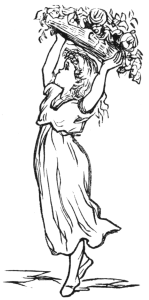
|
My sister May
Has gone away
With April and his showers.
I come apace
To take her place.
Accept my gift of flowers!
|
Transcriber's Notes: Obvious punctuation errors repaired.
The original text for the January issue had a table of contents
that spanned six issues. This was divided amongst those issues.
Additionally, only the January issue had a title page. This page
was copied for the remaining five issues. Each issue had the number
added on the title page after the Volume number.
End of Project Gutenberg's The Nursery, June 1881, Vol. XXIX, by Various
*** END OF THIS PROJECT GUTENBERG EBOOK THE NURSERY, JUNE 1881, VOL. XXIX ***
***** This file should be named 40757-h.htm or 40757-h.zip *****
This and all associated files of various formats will be found in:
http://www.gutenberg.org/4/0/7/5/40757/
Produced by Emmy, Juliet Sutherland and the Online
Distributed Proofreading Team at http://www.pgdp.net Music
transcribed by June Troyer.
Updated editions will replace the previous one--the old editions
will be renamed.
Creating the works from public domain print editions means that no
one owns a United States copyright in these works, so the Foundation
(and you!) can copy and distribute it in the United States without
permission and without paying copyright royalties. Special rules,
set forth in the General Terms of Use part of this license, apply to
copying and distributing Project Gutenberg-tm electronic works to
protect the PROJECT GUTENBERG-tm concept and trademark. Project
Gutenberg is a registered trademark, and may not be used if you
charge for the eBooks, unless you receive specific permission. If you
do not charge anything for copies of this eBook, complying with the
rules is very easy. You may use this eBook for nearly any purpose
such as creation of derivative works, reports, performances and
research. They may be modified and printed and given away--you may do
practically ANYTHING with public domain eBooks. Redistribution is
subject to the trademark license, especially commercial
redistribution.
*** START: FULL LICENSE ***
THE FULL PROJECT GUTENBERG LICENSE
PLEASE READ THIS BEFORE YOU DISTRIBUTE OR USE THIS WORK
To protect the Project Gutenberg-tm mission of promoting the free
distribution of electronic works, by using or distributing this work
(or any other work associated in any way with the phrase "Project
Gutenberg"), you agree to comply with all the terms of the Full Project
Gutenberg-tm License available with this file or online at
www.gutenberg.org/license.
Section 1. General Terms of Use and Redistributing Project Gutenberg-tm
electronic works
1.A. By reading or using any part of this Project Gutenberg-tm
electronic work, you indicate that you have read, understand, agree to
and accept all the terms of this license and intellectual property
(trademark/copyright) agreement. If you do not agree to abide by all
the terms of this agreement, you must cease using and return or destroy
all copies of Project Gutenberg-tm electronic works in your possession.
If you paid a fee for obtaining a copy of or access to a Project
Gutenberg-tm electronic work and you do not agree to be bound by the
terms of this agreement, you may obtain a refund from the person or
entity to whom you paid the fee as set forth in paragraph 1.E.8.
1.B. "Project Gutenberg" is a registered trademark. It may only be
used on or associated in any way with an electronic work by people who
agree to be bound by the terms of this agreement. There are a few
things that you can do with most Project Gutenberg-tm electronic works
even without complying with the full terms of this agreement. See
paragraph 1.C below. There are a lot of things you can do with Project
Gutenberg-tm electronic works if you follow the terms of this agreement
and help preserve free future access to Project Gutenberg-tm electronic
works. See paragraph 1.E below.
1.C. The Project Gutenberg Literary Archive Foundation ("the Foundation"
or PGLAF), owns a compilation copyright in the collection of Project
Gutenberg-tm electronic works. Nearly all the individual works in the
collection are in the public domain in the United States. If an
individual work is in the public domain in the United States and you are
located in the United States, we do not claim a right to prevent you from
copying, distributing, performing, displaying or creating derivative
works based on the work as long as all references to Project Gutenberg
are removed. Of course, we hope that you will support the Project
Gutenberg-tm mission of promoting free access to electronic works by
freely sharing Project Gutenberg-tm works in compliance with the terms of
this agreement for keeping the Project Gutenberg-tm name associated with
the work. You can easily comply with the terms of this agreement by
keeping this work in the same format with its attached full Project
Gutenberg-tm License when you share it without charge with others.
1.D. The copyright laws of the place where you are located also govern
what you can do with this work. Copyright laws in most countries are in
a constant state of change. If you are outside the United States, check
the laws of your country in addition to the terms of this agreement
before downloading, copying, displaying, performing, distributing or
creating derivative works based on this work or any other Project
Gutenberg-tm work. The Foundation makes no representations concerning
the copyright status of any work in any country outside the United
States.
1.E. Unless you have removed all references to Project Gutenberg:
1.E.1. The following sentence, with active links to, or other immediate
access to, the full Project Gutenberg-tm License must appear prominently
whenever any copy of a Project Gutenberg-tm work (any work on which the
phrase "Project Gutenberg" appears, or with which the phrase "Project
Gutenberg" is associated) is accessed, displayed, performed, viewed,
copied or distributed:
This eBook is for the use of anyone anywhere at no cost and with
almost no restrictions whatsoever. You may copy it, give it away or
re-use it under the terms of the Project Gutenberg License included
with this eBook or online at www.gutenberg.org
1.E.2. If an individual Project Gutenberg-tm electronic work is derived
from the public domain (does not contain a notice indicating that it is
posted with permission of the copyright holder), the work can be copied
and distributed to anyone in the United States without paying any fees
or charges. If you are redistributing or providing access to a work
with the phrase "Project Gutenberg" associated with or appearing on the
work, you must comply either with the requirements of paragraphs 1.E.1
through 1.E.7 or obtain permission for the use of the work and the
Project Gutenberg-tm trademark as set forth in paragraphs 1.E.8 or
1.E.9.
1.E.3. If an individual Project Gutenberg-tm electronic work is posted
with the permission of the copyright holder, your use and distribution
must comply with both paragraphs 1.E.1 through 1.E.7 and any additional
terms imposed by the copyright holder. Additional terms will be linked
to the Project Gutenberg-tm License for all works posted with the
permission of the copyright holder found at the beginning of this work.
1.E.4. Do not unlink or detach or remove the full Project Gutenberg-tm
License terms from this work, or any files containing a part of this
work or any other work associated with Project Gutenberg-tm.
1.E.5. Do not copy, display, perform, distribute or redistribute this
electronic work, or any part of this electronic work, without
prominently displaying the sentence set forth in paragraph 1.E.1 with
active links or immediate access to the full terms of the Project
Gutenberg-tm License.
1.E.6. You may convert to and distribute this work in any binary,
compressed, marked up, nonproprietary or proprietary form, including any
word processing or hypertext form. However, if you provide access to or
distribute copies of a Project Gutenberg-tm work in a format other than
"Plain Vanilla ASCII" or other format used in the official version
posted on the official Project Gutenberg-tm web site (www.gutenberg.org),
you must, at no additional cost, fee or expense to the user, provide a
copy, a means of exporting a copy, or a means of obtaining a copy upon
request, of the work in its original "Plain Vanilla ASCII" or other
form. Any alternate format must include the full Project Gutenberg-tm
License as specified in paragraph 1.E.1.
1.E.7. Do not charge a fee for access to, viewing, displaying,
performing, copying or distributing any Project Gutenberg-tm works
unless you comply with paragraph 1.E.8 or 1.E.9.
1.E.8. You may charge a reasonable fee for copies of or providing
access to or distributing Project Gutenberg-tm electronic works provided
that
- You pay a royalty fee of 20% of the gross profits you derive from
the use of Project Gutenberg-tm works calculated using the method
you already use to calculate your applicable taxes. The fee is
owed to the owner of the Project Gutenberg-tm trademark, but he
has agreed to donate royalties under this paragraph to the
Project Gutenberg Literary Archive Foundation. Royalty payments
must be paid within 60 days following each date on which you
prepare (or are legally required to prepare) your periodic tax
returns. Royalty payments should be clearly marked as such and
sent to the Project Gutenberg Literary Archive Foundation at the
address specified in Section 4, "Information about donations to
the Project Gutenberg Literary Archive Foundation."
- You provide a full refund of any money paid by a user who notifies
you in writing (or by e-mail) within 30 days of receipt that s/he
does not agree to the terms of the full Project Gutenberg-tm
License. You must require such a user to return or
destroy all copies of the works possessed in a physical medium
and discontinue all use of and all access to other copies of
Project Gutenberg-tm works.
- You provide, in accordance with paragraph 1.F.3, a full refund of any
money paid for a work or a replacement copy, if a defect in the
electronic work is discovered and reported to you within 90 days
of receipt of the work.
- You comply with all other terms of this agreement for free
distribution of Project Gutenberg-tm works.
1.E.9. If you wish to charge a fee or distribute a Project Gutenberg-tm
electronic work or group of works on different terms than are set
forth in this agreement, you must obtain permission in writing from
both the Project Gutenberg Literary Archive Foundation and Michael
Hart, the owner of the Project Gutenberg-tm trademark. Contact the
Foundation as set forth in Section 3 below.
1.F.
1.F.1. Project Gutenberg volunteers and employees expend considerable
effort to identify, do copyright research on, transcribe and proofread
public domain works in creating the Project Gutenberg-tm
collection. Despite these efforts, Project Gutenberg-tm electronic
works, and the medium on which they may be stored, may contain
"Defects," such as, but not limited to, incomplete, inaccurate or
corrupt data, transcription errors, a copyright or other intellectual
property infringement, a defective or damaged disk or other medium, a
computer virus, or computer codes that damage or cannot be read by
your equipment.
1.F.2. LIMITED WARRANTY, DISCLAIMER OF DAMAGES - Except for the "Right
of Replacement or Refund" described in paragraph 1.F.3, the Project
Gutenberg Literary Archive Foundation, the owner of the Project
Gutenberg-tm trademark, and any other party distributing a Project
Gutenberg-tm electronic work under this agreement, disclaim all
liability to you for damages, costs and expenses, including legal
fees. YOU AGREE THAT YOU HAVE NO REMEDIES FOR NEGLIGENCE, STRICT
LIABILITY, BREACH OF WARRANTY OR BREACH OF CONTRACT EXCEPT THOSE
PROVIDED IN PARAGRAPH 1.F.3. YOU AGREE THAT THE FOUNDATION, THE
TRADEMARK OWNER, AND ANY DISTRIBUTOR UNDER THIS AGREEMENT WILL NOT BE
LIABLE TO YOU FOR ACTUAL, DIRECT, INDIRECT, CONSEQUENTIAL, PUNITIVE OR
INCIDENTAL DAMAGES EVEN IF YOU GIVE NOTICE OF THE POSSIBILITY OF SUCH
DAMAGE.
1.F.3. LIMITED RIGHT OF REPLACEMENT OR REFUND - If you discover a
defect in this electronic work within 90 days of receiving it, you can
receive a refund of the money (if any) you paid for it by sending a
written explanation to the person you received the work from. If you
received the work on a physical medium, you must return the medium with
your written explanation. The person or entity that provided you with
the defective work may elect to provide a replacement copy in lieu of a
refund. If you received the work electronically, the person or entity
providing it to you may choose to give you a second opportunity to
receive the work electronically in lieu of a refund. If the second copy
is also defective, you may demand a refund in writing without further
opportunities to fix the problem.
1.F.4. Except for the limited right of replacement or refund set forth
in paragraph 1.F.3, this work is provided to you 'AS-IS', WITH NO OTHER
WARRANTIES OF ANY KIND, EXPRESS OR IMPLIED, INCLUDING BUT NOT LIMITED TO
WARRANTIES OF MERCHANTABILITY OR FITNESS FOR ANY PURPOSE.
1.F.5. Some states do not allow disclaimers of certain implied
warranties or the exclusion or limitation of certain types of damages.
If any disclaimer or limitation set forth in this agreement violates the
law of the state applicable to this agreement, the agreement shall be
interpreted to make the maximum disclaimer or limitation permitted by
the applicable state law. The invalidity or unenforceability of any
provision of this agreement shall not void the remaining provisions.
1.F.6. INDEMNITY - You agree to indemnify and hold the Foundation, the
trademark owner, any agent or employee of the Foundation, anyone
providing copies of Project Gutenberg-tm electronic works in accordance
with this agreement, and any volunteers associated with the production,
promotion and distribution of Project Gutenberg-tm electronic works,
harmless from all liability, costs and expenses, including legal fees,
that arise directly or indirectly from any of the following which you do
or cause to occur: (a) distribution of this or any Project Gutenberg-tm
work, (b) alteration, modification, or additions or deletions to any
Project Gutenberg-tm work, and (c) any Defect you cause.
Section 2. Information about the Mission of Project Gutenberg-tm
Project Gutenberg-tm is synonymous with the free distribution of
electronic works in formats readable by the widest variety of computers
including obsolete, old, middle-aged and new computers. It exists
because of the efforts of hundreds of volunteers and donations from
people in all walks of life.
Volunteers and financial support to provide volunteers with the
assistance they need are critical to reaching Project Gutenberg-tm's
goals and ensuring that the Project Gutenberg-tm collection will
remain freely available for generations to come. In 2001, the Project
Gutenberg Literary Archive Foundation was created to provide a secure
and permanent future for Project Gutenberg-tm and future generations.
To learn more about the Project Gutenberg Literary Archive Foundation
and how your efforts and donations can help, see Sections 3 and 4
and the Foundation information page at www.gutenberg.org
Section 3. Information about the Project Gutenberg Literary Archive
Foundation
The Project Gutenberg Literary Archive Foundation is a non profit
501(c)(3) educational corporation organized under the laws of the
state of Mississippi and granted tax exempt status by the Internal
Revenue Service. The Foundation's EIN or federal tax identification
number is 64-6221541. Contributions to the Project Gutenberg
Literary Archive Foundation are tax deductible to the full extent
permitted by U.S. federal laws and your state's laws.
The Foundation's principal office is located at 4557 Melan Dr. S.
Fairbanks, AK, 99712., but its volunteers and employees are scattered
throughout numerous locations. Its business office is located at 809
North 1500 West, Salt Lake City, UT 84116, (801) 596-1887. Email
contact links and up to date contact information can be found at the
Foundation's web site and official page at www.gutenberg.org/contact
For additional contact information:
Dr. Gregory B. Newby
Chief Executive and Director
[email protected]
Section 4. Information about Donations to the Project Gutenberg
Literary Archive Foundation
Project Gutenberg-tm depends upon and cannot survive without wide
spread public support and donations to carry out its mission of
increasing the number of public domain and licensed works that can be
freely distributed in machine readable form accessible by the widest
array of equipment including outdated equipment. Many small donations
($1 to $5,000) are particularly important to maintaining tax exempt
status with the IRS.
The Foundation is committed to complying with the laws regulating
charities and charitable donations in all 50 states of the United
States. Compliance requirements are not uniform and it takes a
considerable effort, much paperwork and many fees to meet and keep up
with these requirements. We do not solicit donations in locations
where we have not received written confirmation of compliance. To
SEND DONATIONS or determine the status of compliance for any
particular state visit www.gutenberg.org/donate
While we cannot and do not solicit contributions from states where we
have not met the solicitation requirements, we know of no prohibition
against accepting unsolicited donations from donors in such states who
approach us with offers to donate.
International donations are gratefully accepted, but we cannot make
any statements concerning tax treatment of donations received from
outside the United States. U.S. laws alone swamp our small staff.
Please check the Project Gutenberg Web pages for current donation
methods and addresses. Donations are accepted in a number of other
ways including checks, online payments and credit card donations.
To donate, please visit: www.gutenberg.org/donate
Section 5. General Information About Project Gutenberg-tm electronic
works.
Professor Michael S. Hart was the originator of the Project Gutenberg-tm
concept of a library of electronic works that could be freely shared
with anyone. For forty years, he produced and distributed Project
Gutenberg-tm eBooks with only a loose network of volunteer support.
Project Gutenberg-tm eBooks are often created from several printed
editions, all of which are confirmed as Public Domain in the U.S.
unless a copyright notice is included. Thus, we do not necessarily
keep eBooks in compliance with any particular paper edition.
Most people start at our Web site which has the main PG search facility:
www.gutenberg.org
This Web site includes information about Project Gutenberg-tm,
including how to make donations to the Project Gutenberg Literary
Archive Foundation, how to help produce our new eBooks, and how to
subscribe to our email newsletter to hear about new eBooks.
